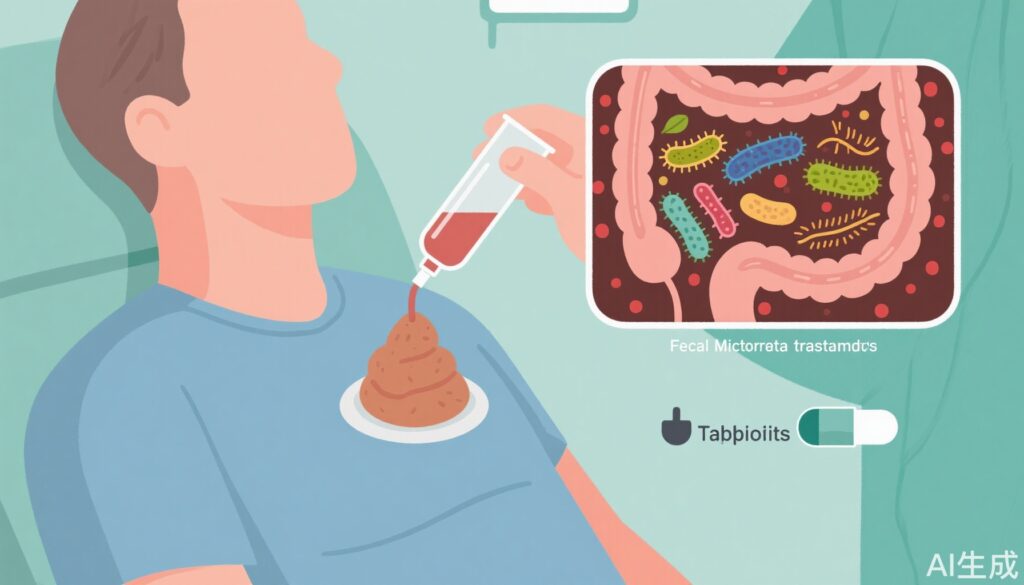Highlights
- Fecal microbiota transplantation (FMT) demonstrated noninferiority to oral vancomycin for primary Clostridioides difficile infection (CDI) in a randomized, multicenter trial.
- Clinical cure at 14 days with no recurrence at 60 days was achieved in 66.7% with FMT and 61.2% with vancomycin; the difference was not statistically significant and met the predefined noninferiority margin.
- Adverse event rates were comparable between groups, with no new safety signals associated with FMT.
- These findings suggest FMT may be considered as first-line therapy for primary CDI, challenging current practice limited to recurrent disease.
Clinical Background and Disease Burden
Clostridioides difficile infection (CDI) remains one of the leading causes of healthcare-associated diarrhea, contributing to significant morbidity, mortality, and healthcare costs globally. First-line treatment of primary CDI typically involves antibiotics such as vancomycin or fidaxomicin. While effective, antibiotic therapy is associated with notable recurrence rates (up to 25% for initial episodes), and each subsequent recurrence increases the risk of further relapses. Fecal microbiota transplantation (FMT)—the infusion of processed stool from healthy donors to restore gut microbiota—has revolutionized the management of recurrent CDI, demonstrating superior efficacy compared to antibiotics in this context. However, its role in treating primary CDI, before any recurrence, has remained unclear and controversial due to lack of robust evidence and concerns regarding safety, logistics, and long-term outcomes.
Research Methodology
This was a randomized, open-label, noninferiority, multicenter trial (ClinicalTrials.gov: NCT03796650) conducted in hospitals and primary care facilities across Norway. Eligible patients were adults diagnosed with primary CDI, defined by the presence of C. difficile toxin in stool, at least three loose stools daily, and no prior CDI episode in the preceding year.
Patients were randomly assigned to one of two arms:
- FMT administered without antibiotic pretreatment
- Oral vancomycin, 125 mg four times daily for 10 days
The primary endpoint was clinical cure—defined as firm stools or fewer than three bowel movements daily at day 14, with no CDI recurrence within 60 days—achieved with the assigned treatment alone. Secondary endpoints included cure with or without additional treatment and safety/adverse events.
Key Findings
Of 104 patients randomized, 100 were included in the modified intention-to-treat analysis (51 FMT, 49 vancomycin). Clinical cure with no recurrence at 60 days, without additional therapy, was observed in 34 of 51 patients (66.7%) in the FMT group versus 30 of 49 (61.2%) in the vancomycin group (difference, 5.4 percentage points; 95.2% CI, -13.5 to 24.4). The P-value for noninferiority was <0.001, rejecting the hypothesis that FMT was more than 25 percentage points inferior to vancomycin. Thus, FMT met the prespecified criterion for noninferiority.
When including patients who achieved cure with additional CDI treatment, cure rates were 78.4% for FMT and 61.2% for vancomycin (difference, 17.2 percentage points; 95.2% CI, -0.7 to 35.1). Eleven FMT patients and four vancomycin patients received additional CDI therapy. Importantly, adverse event profiles were similar between groups, with no new safety concerns identified for FMT.
A graphical summary of outcomes is presented below:
| Outcome | FMT (n=51) | Vancomycin (n=49) | Difference (95% CI) |
| Cure at day 14, no recurrence at 60 days | 66.7% | 61.2% | 5.4% (-13.5, 24.4) |
| Cure with/without additional treatment | 78.4% | 61.2% | 17.2% (-0.7, 35.1) |
Mechanistic Insights and Biological Plausibility
The rationale for FMT in CDI is grounded in the restoration of healthy intestinal microbiota, which is disrupted by antibiotics and C. difficile overgrowth. FMT introduces a diverse microbial community, re-establishing colonization resistance and reducing the likelihood of further CDI episodes. While this mechanism is well-validated for recurrent CDI, its benefit in primary CDI, where endogenous microbiota may be less severely depleted, is biologically plausible but less certain. The current trial supports the concept that even in primary CDI, rapid restoration of microbial diversity via FMT can achieve outcomes comparable to targeted antibiotic therapy.
Expert Commentary
Current guidelines (e.g., IDSA/SHEA) recommend FMT only after multiple CDI recurrences, citing insufficient evidence for use in initial episodes. However, this trial challenges the paradigm, suggesting FMT is at least as effective—and potentially superior when allowing for rescue therapy—even in first-episode CDI. As Dr. Juul and colleagues state, “FMT may be considered as first-line therapy in primary CDI.” These findings may prompt guideline panels to revisit recommendations, particularly for patients at high risk of recurrence or with contraindications to antibiotics.
Controversies and Limitations
The study’s open-label design introduces potential bias, particularly in subjective endpoints (e.g., assessment of stool consistency). The reliance on clinical, rather than microbiological, endpoints is another limitation, as is the relatively modest sample size. Generalizability may be affected by the Norwegian healthcare setting, established infrastructure for donor screening, and regulatory frameworks, which may not be readily replicable elsewhere. Furthermore, the long-term safety of FMT—especially in immunocompromised or elderly populations—remains a subject of ongoing surveillance.
Conclusion
This rigorously conducted randomized trial demonstrates that FMT is noninferior to oral vancomycin for the treatment of primary CDI, with similar cure rates and safety profiles. These data suggest that FMT could be considered as a first-line therapeutic option in select patients with primary CDI. Further research is needed to confirm these findings in broader populations and to address implementation challenges, including donor recruitment, standardization of FMT protocols, and long-term monitoring.
References
Juul FE, Bretthauer M, Johnsen PH, Samy F, Tonby K, Berdal JE, et al. Fecal Microbiota Transplantation Versus Vancomycin for Primary Clostridioides difficile Infection: A Randomized Controlled Trial. Ann Intern Med. 2025 Jul;178(7):940-947. doi: 10.7326/ANNALS-24-03285 IF: 15.2 Q1 .
Leung J, Pham S. A Systematic Review of Fecal Microbiota Transplantation Versus Vancomycin for Treatment of Recurrent Clostridioides difficile Infection. Gastroenterol Nurs. 2021 Mar-Apr;44(2):106-115. doi: 10.1097/SGA.0000000000000529 IF: 0.8 Q4 . PMID: 33795620 IF: 0.8 Q4 .
Xu Q, Zhang S, Quan J, Wu Z, Gu S, Chen Y, Zheng B, Lv L, Li L. The evaluation of fecal microbiota transplantation vs vancomycin in a Clostridioides difficile infection model. Appl Microbiol Biotechnol. 2022 Oct;106(19-20):6689-6700. doi: 10.1007/s00253-022-12154-z IF: 4.3 Q1 . PMID: 36085529 IF: 4.3 Q1 .


